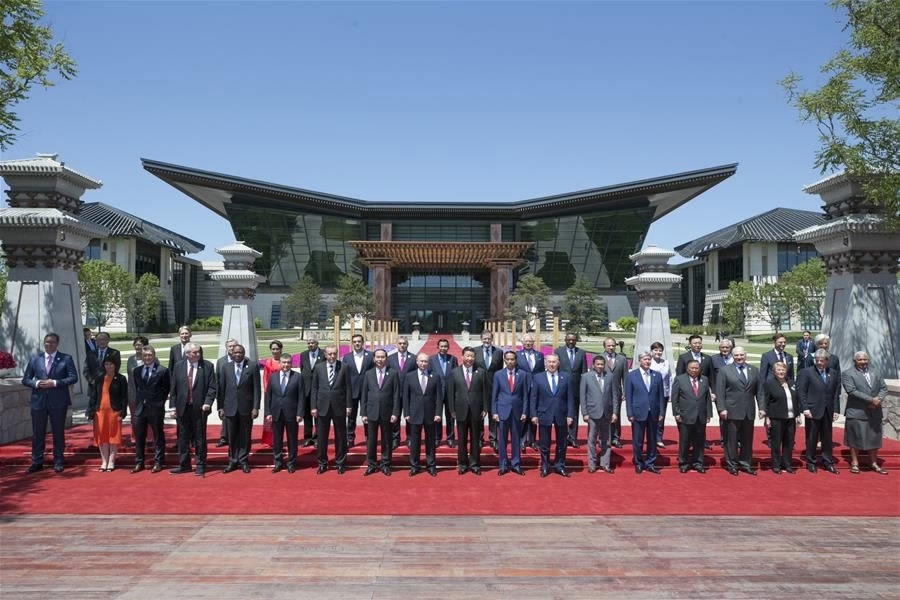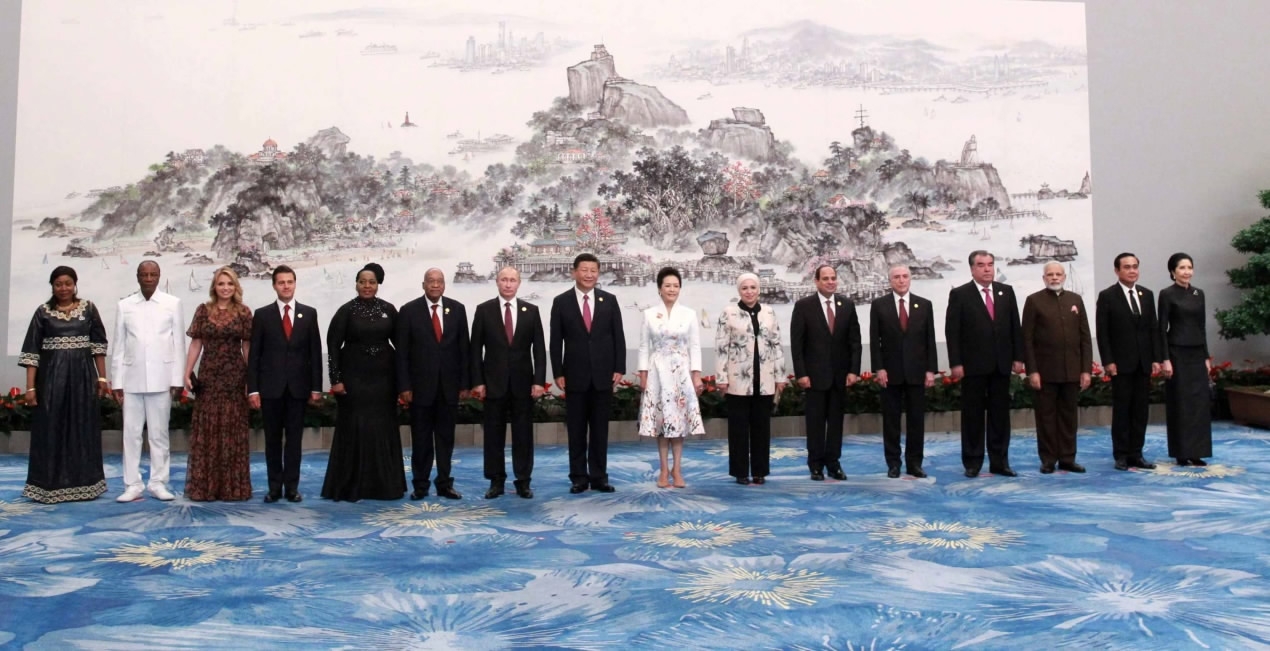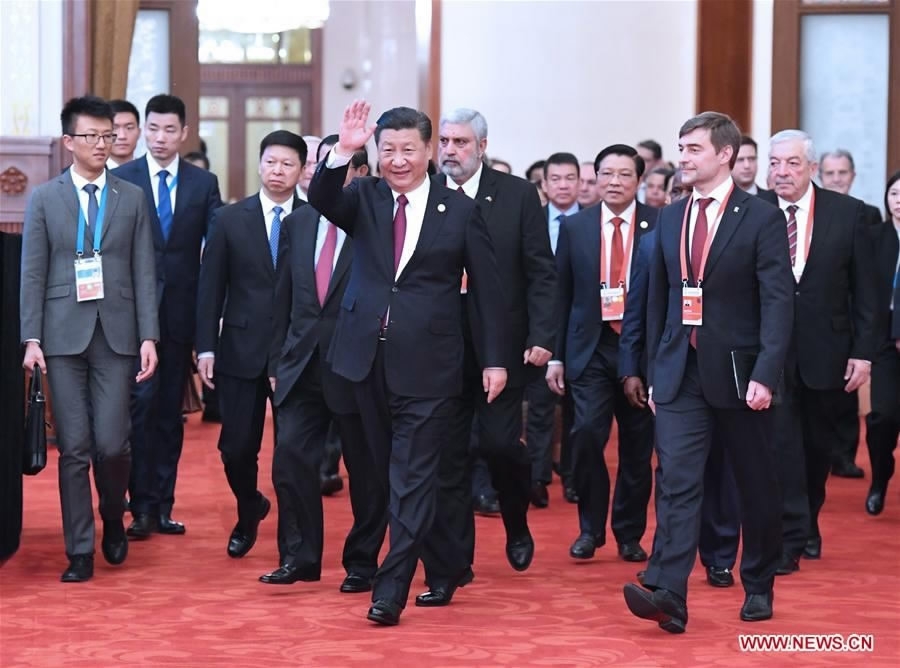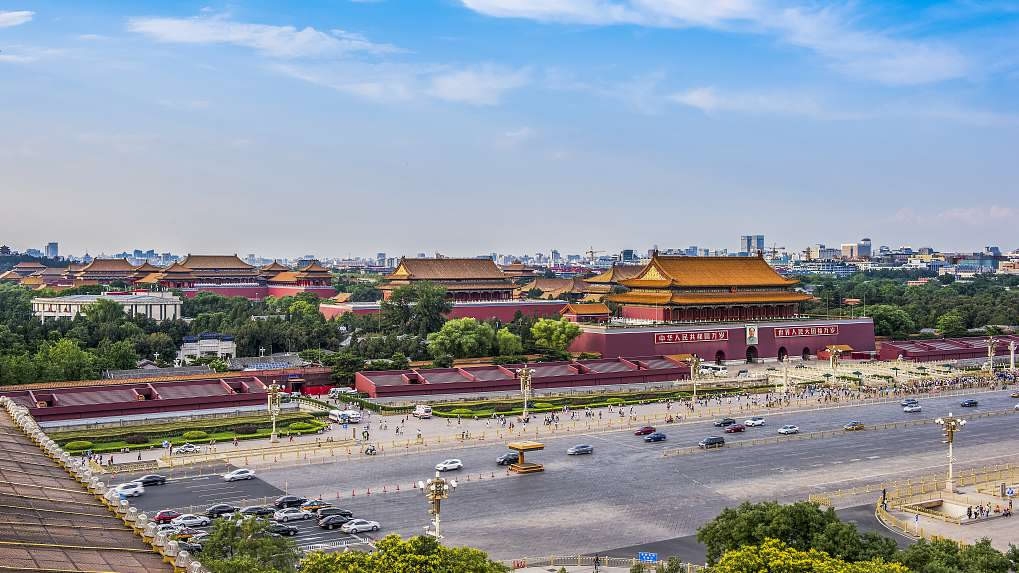The year has been memorable for China on the world stage.
Politically, the vision of Xi Jinping, general secretary of the Communist Party of China (CPC) Central Committee, was clearly detailed in his work report to the 19th CPC National Congress that reflected a sea change in global leadership ideology.
Unlike Western nations that traditionally grow into hegemony as their economic might and influence increases, China, as a “great modern socialist country,” Xi said, seeks to share the benefits with other nations in terms of a community of shared future for humankind.
Also, as Xi reiterates that China’s development can’t be in isolation from the rest of the world, the leadership, using a moral compass, has promoted a new approach to building a multipolar world based on sharing wealth and combating poverty together.

Chinese President Xi Jinping, foreign delegation heads and guests pose for a group photo at the Leaders' Roundtable Summit of the Belt and Road Forum for International Cooperation at Yanqi Lake International Convention Center in Beijing on May 15. /Xinhua Photo
Chinese President Xi Jinping, foreign delegation heads and guests pose for a group photo at the Leaders' Roundtable Summit of the Belt and Road Forum for International Cooperation at Yanqi Lake International Convention Center in Beijing on May 15. /Xinhua Photo
Given this, China held the
Belt & Road Forum for International Cooperation in Beijing in May when President Xi vowed to boost financial support for the Belt & Road Initiative amid China’s substantial efforts to transfer the strategic plan into practical projects.
Diplomatically speaking, it is a truly grand vision of creating global connectivity and is a crucial reflection of China's changing role and focus on growing innovation and education that makes the nations of the world potential partners in the coming decades.
The forum was the highest-level meeting on the initiative since it was put forward in 2013. It was attended by 29 foreign heads of state and government leaders among representatives of governments, businesses and media from over 130 countries and regions.
China made an announcement of its investment in infrastructure connectivity along with a number of substantial aid and assistance programs in areas such as food, home and healthcare to participating developing countries.
From the message delivered during the forum, it is clear that “the Belt & Road development does not shut out, nor is it directed against, any party.” Although initiated in China, the whole concept and practice of the Belt and Road belong to the world en bloc.

The leaders of BRICS countries and five emerging markets and developing countries, and their spouses, pose for a group photo ahead of a banquet during the BRICS Summit in Xiamen, China, September 4. /AFP Photo
The leaders of BRICS countries and five emerging markets and developing countries, and their spouses, pose for a group photo ahead of a banquet during the BRICS Summit in Xiamen, China, September 4. /AFP Photo
With the firm belief in cooperation and commitment, China next held the
BRICS (Brazil, Russia, India, China and South Africa) Xiamen summit in September under the theme "Stronger Partnership for a Brighter Future."
Xi argued then for working with member states of the club “to take stock of BRICS' cooperation, map out a blueprint for its future development and set sail on a new journey of cooperation.”
As a rising power, China is eager to demonstrate to the world that, along with other emerging nations, it has not entertained any scheme to challenge the status quo.
Yet, considering the poverty and inequality worldwide, China and other BRICS member states have favored economic, political and people-to-people cooperation in an open, inclusive and win-win spirit. They have worked in unison with other emerging markets and developing countries to uphold international justice and equity and foster a sound external environment.
True, since the five BRICS member states have different national conditions, the decade-long cooperation among them indicates that the shared interest in pursuing development and prosperity through partnership has enabled BRICS to rise above ideological and cultural differences and seek win-win results.
Globally, the communities expect BRICS to make a greater contribution to the peace and common development of all nations.

Xi Jinping, general secretary of the Communist Party of China (CPC) Central Committee, walks with foreign guests to attend the opening ceremony of CPC in Dialogue with World Political Parties High-level Meeting in Beijing on December 1. /Xinhua Photo
Xi Jinping, general secretary of the Communist Party of China (CPC) Central Committee, walks with foreign guests to attend the opening ceremony of CPC in Dialogue with World Political Parties High-level Meeting in Beijing on December 1. /Xinhua Photo
In light of the building of a community of shared future for humankind, China’s ruling party in December held the
CPC in dialogue with the World Political Parties High-level Meeting in Beijing. Once again, Xi declared that the CPC not only seeks to make China wealthier and stronger, but also aims to benefit all human communities.
Regarding the suspicion and fear of the rise of China among some abroad, Xi stated that China would neither “import” a foreign development model nor “export” its own social, cultural and economic models to other countries. Not to mince matters, whenever necessary, China’s model might provide better alternatives common and beneficial to all.
In brief, as China steadily moves into 2018, a new era will witness Chinese diplomacy that is more proactive and responsible.
To that end, China will make all efforts to test the validity of the concepts put forward by Xi, such as a new type of major powers’ relationship, major powers' diplomacy with Chinese traits, a global community of shared future, and a new type of international relations.
Though historically unprecedented, China under Xi’s vision and leadership appears to have moved nearer to a historic rejuvenation of the Chinese nation.
(Wang Li is a professor of international relations and diplomacy at the School of International & Public Affairs at Jilin University. The article reflects the author’s opinion, not necessarily the views of CGTN.)





